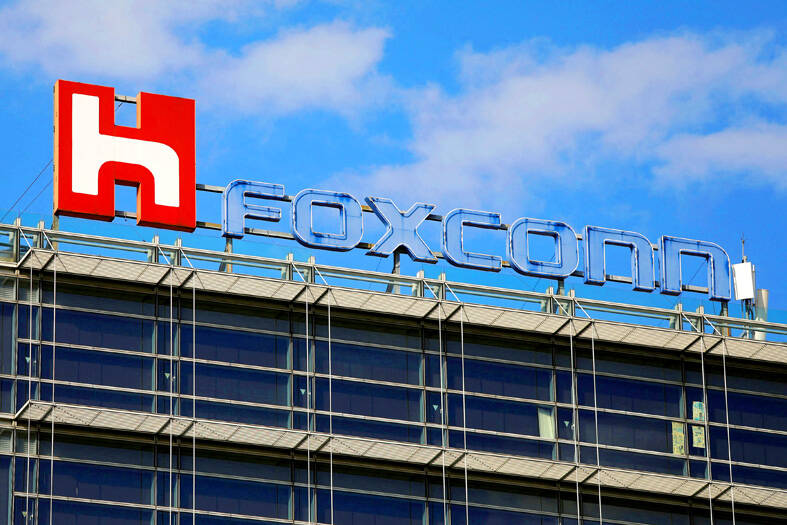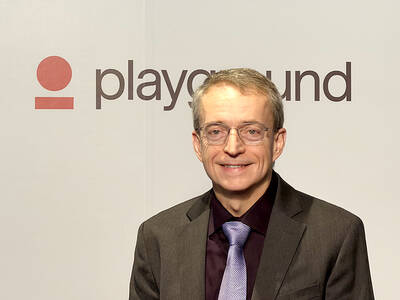Hon Hai Precision Industry Co (鴻海精密), a major iPhone assembler, yesterday said it has inked a memorandum of understanding (MOU) with Mitsubishi Fuso Truck and Bus Corp to develop and manufacture electric buses.
Hon Hai and Mitsubishi are to collaborate through their respective automotive subsidiaries Foxtron Vehicle Technologies (鴻華先進) and Mitsubishi Fuso Bus Manufacturing Co, Hon Hai said in a news release.
Foxtron Vehicle is a joint venture between Hon Hai and a domestic automaker Yulon Motor Co (裕隆汽車).

Photo: Tyrone Siu, Reuters
Foxtron Vehicle and Mitsubishi Fuso are to collaborate on the development, production, supply chain management and sales of zero-emission buses (ZEV), based on Foxtron’s Model T and Model U electric bus platforms, Hon Hai said.
The Model T, an electric bus, has been commercially available since 2022 on the domestic market.
The collaboration aims to bolster the two companies’ strategic partnership in zero-emission buses and expand their presence in clean energy transportation, it said.
Based on the contract, Foxtron and Mitsubishi Fuso will further discuss potential business models for the Fuso brand and advance development of the new bus models to be manufactured in Japan, it said.
The Japanese automaker would primarily oversee development, production and commercialization in target markets, while also assessing the possibility of importing internal combustion engine buses and ZEVs into related markets, it said.
Through the partnership, the two companies aim to offer a wider range of products to meet the rapidly evolving bus market to achieve sustainable sales growth, Hon Hai said.

The number of Taiwanese working in the US rose to a record high of 137,000 last year, driven largely by Taiwan Semiconductor Manufacturing Co’s (TSMC, 台積電) rapid overseas expansion, according to government data released yesterday. A total of 666,000 Taiwanese nationals were employed abroad last year, an increase of 45,000 from 2023 and the highest level since the COVID-19 pandemic, data from the Directorate-General of Budget, Accounting and Statistics (DGBAS) showed. Overseas employment had steadily increased between 2009 and 2019, peaking at 739,000, before plunging to 319,000 in 2021 amid US-China trade tensions, global supply chain shifts, reshoring by Taiwanese companies and

Taiwan Semiconductor Manufacturing Co (TSMC, 台積電) received about NT$147 billion (US$4.71 billion) in subsidies from the US, Japanese, German and Chinese governments over the past two years for its global expansion. Financial data compiled by the world’s largest contract chipmaker showed the company secured NT$4.77 billion in subsidies from the governments in the third quarter, bringing the total for the first three quarters of the year to about NT$71.9 billion. Along with the NT$75.16 billion in financial aid TSMC received last year, the chipmaker obtained NT$147 billion in subsidies in almost two years, the data showed. The subsidies received by its subsidiaries —

Shiina Ito has had fewer Chinese customers at her Tokyo jewelry shop since Beijing issued a travel warning in the wake of a diplomatic spat, but she said she was not concerned. A souring of Tokyo-Beijing relations this month, following remarks by Japanese Prime Minister Sanae Takaichi about Taiwan, has fueled concerns about the impact on the ritzy boutiques, noodle joints and hotels where holidaymakers spend their cash. However, businesses in Tokyo largely shrugged off any anxiety. “Since there are fewer Chinese customers, it’s become a bit easier for Japanese shoppers to visit, so our sales haven’t really dropped,” Ito

OUTLOOK: Pat Gelsinger said he did not expect the heavy AI infrastructure investments by the major cloud service providers to cause an AI bubble to burst soon Building a resilient energy supply chain is crucial for Taiwan to develop artificial intelligence (AI) technology and grow its economy, former Intel Corp chief executive officer Pat Gelsinger said yesterday. Gelsinger, now a general partner at the US venture capital firm Playground Global LLC, was asked at a news conference in Taipei about his views on Taiwan’s hardware development and growing concern over an AI bubble. “Today, the greatest issue in Taiwan isn’t even in the software or in architecture. It is energy,” Gelsinger said. “You are not in the position to have a resilient energy supply chain, and that,